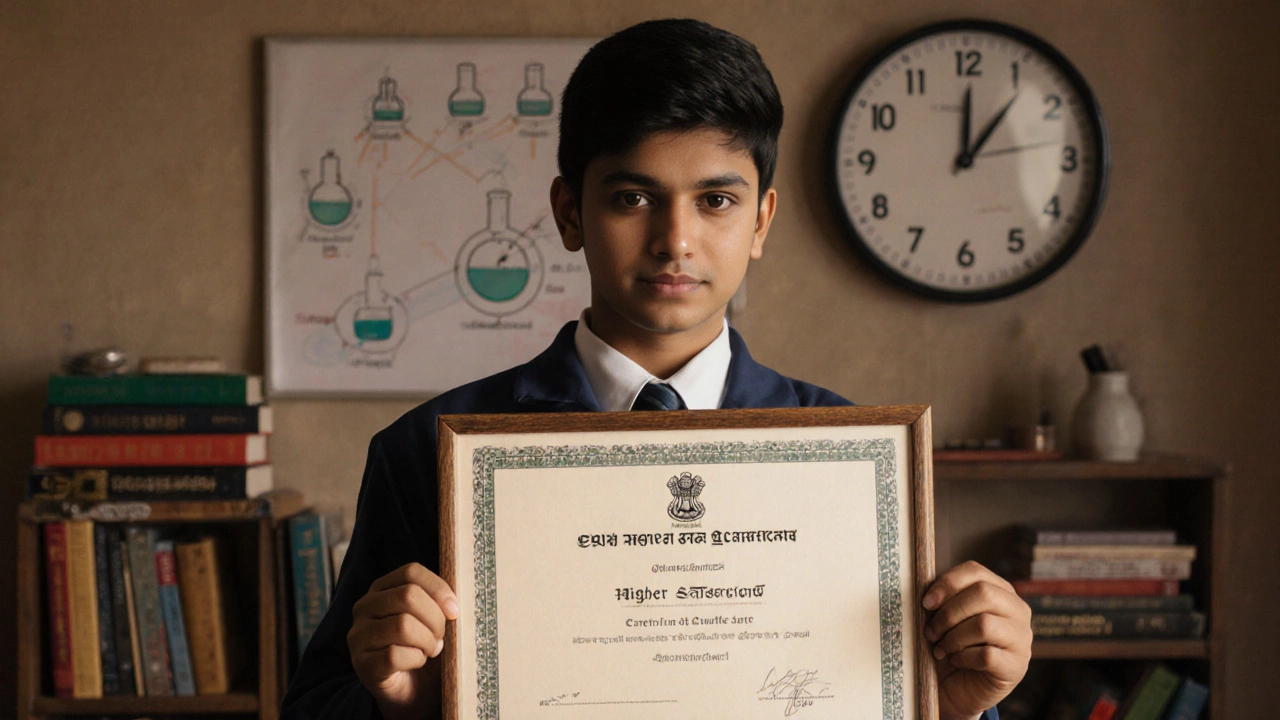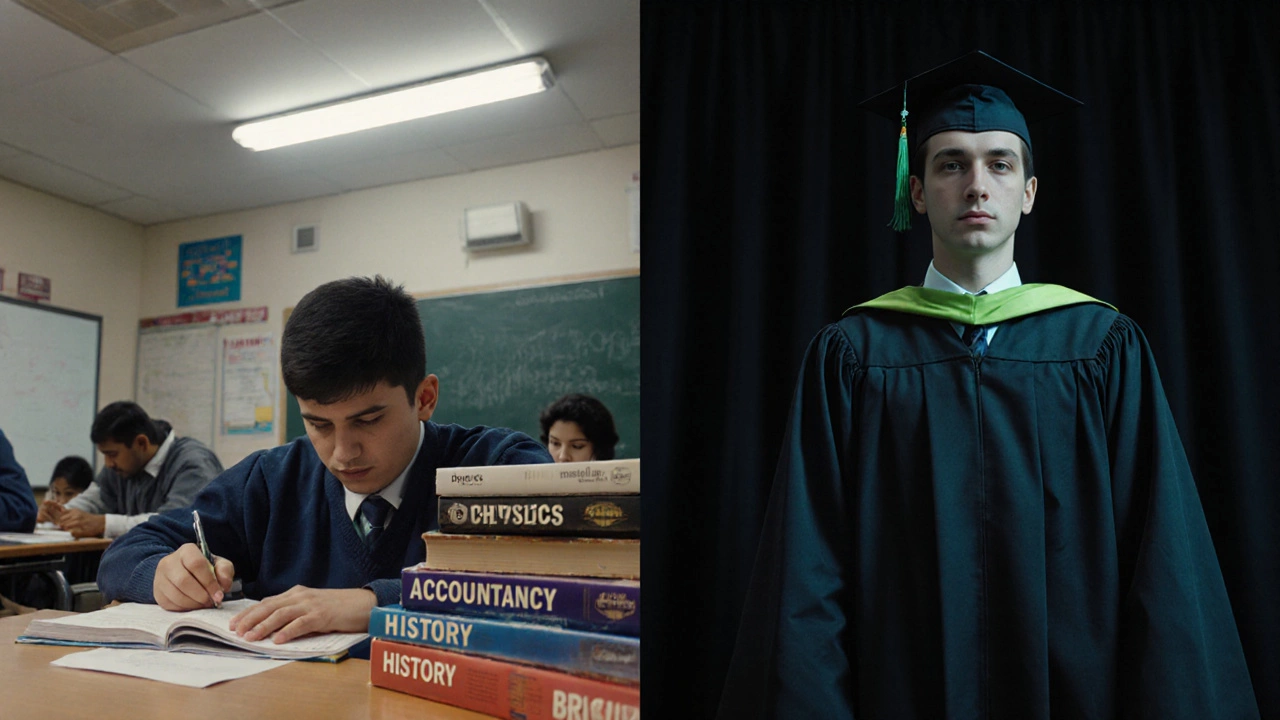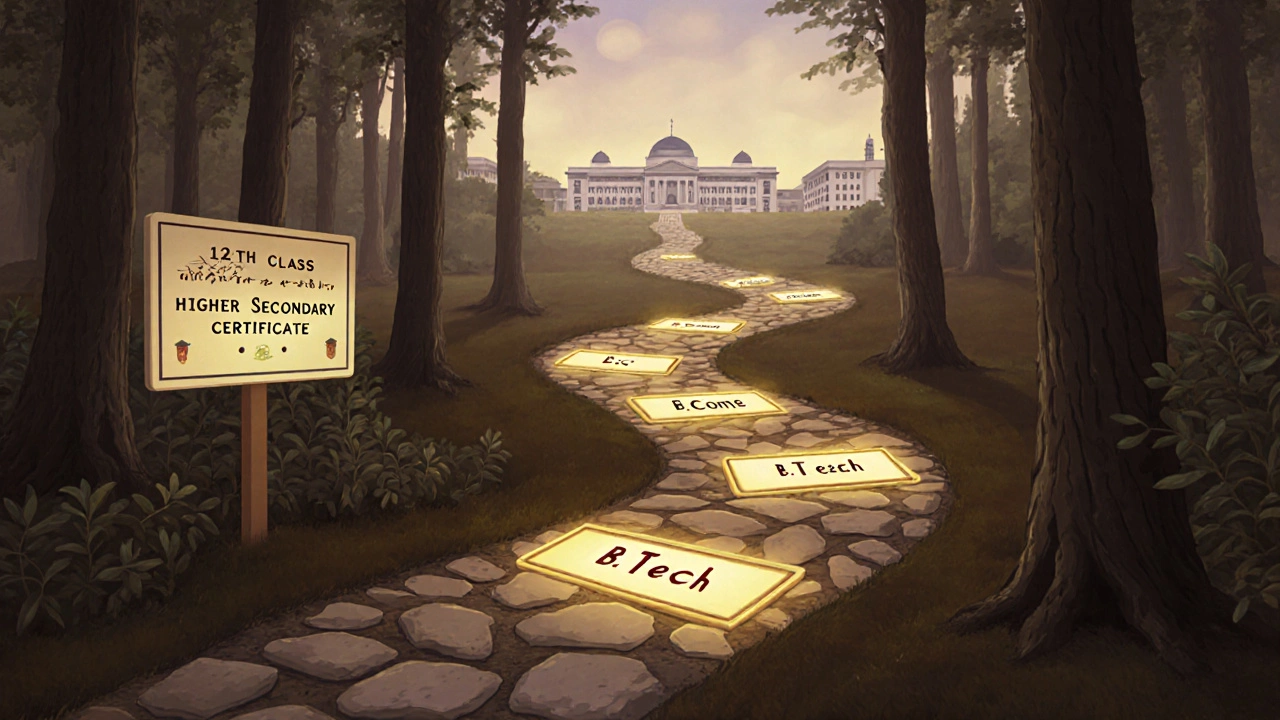What Is a 12th Class Degree Called in India? Understanding the Indian Education System
 Nov, 20 2025
Nov, 20 2025
Higher Education Eligibility Calculator
This tool helps you determine your eligibility for undergraduate programs in India based on your 12th class performance. Use it to plan your next steps after school.
Eligibility Results
People often ask, "What is a 12th class degree called in India?" The short answer: there is no such thing as a "degree" after 12th grade. In India, 12th class isn’t a degree-it’s the final year of school, not college. If you’re coming from a country where high school ends with a diploma or associate degree, this can be confusing. But in India, the education system works differently. After 12th, you enter higher education-where degrees like Bachelor’s, Master’s, or Doctorate begin.
What Exactly Is 12th Class in India?
In India, 12th class is officially called Higher Secondary Education. It’s the last stage of secondary schooling, following 10th grade (Secondary School Certificate or SSC). Students typically enter 11th grade at age 15-16 and finish 12th at 17-18. The curriculum is divided into streams: Science, Commerce, and Humanities/Arts. Each stream has different subjects. For example, Science students study Physics, Chemistry, and Biology (or Mathematics), while Commerce students take Accountancy, Business Studies, and Economics.
The board that conducts the final exam determines the exact name of the certificate. The most common boards are:
- CBSE (Central Board of Secondary Education): Issues the "All India Senior School Certificate Examination (AISSCE)" certificate
- ICSE (Council for the Indian School Certificate Examinations): Issues the "Indian Certificate of Secondary Education" for Class 12
- State Boards: Each state has its own board (like Maharashtra State Board, UP Board) and issues certificates with names like "Higher Secondary Certificate" or "Intermediate Certificate"
So if someone says they passed "CBSE 12th," they mean they completed the CBSE board exam for Class 12. The certificate they get is called the "Senior School Certificate," not a degree.
Why Is It Not Called a Degree?
In India, the word "degree" is legally reserved for college-level qualifications. A degree is awarded after completing a program at a university or college recognized by the University Grants Commission (UGC). The first degree you earn is a Bachelor’s-like B.A., B.Sc., B.Com., or B.Tech. These take 3 to 5 years after 12th class.
Think of it like this: 12th class is like finishing high school in the U.S. or the UK. You don’t call that a degree-you call it a high school diploma. In India, it’s called a "Higher Secondary Certificate" or "School Leaving Certificate." The difference isn’t just wording-it’s about the level of education. Degrees require deeper study, critical thinking, and specialization. 12th class is still foundational.
Confusion often comes from how people speak casually. You might hear someone say, "I did my degree in 12th," but that’s just slang. It’s like saying, "I got my diploma in 10th." It’s incorrect technically, but common in conversation.
What Happens After 12th Class?
After passing 12th class, students have several paths:
- Undergraduate degrees: Enroll in a Bachelor’s program at a university. Popular choices include B.Sc. (Science), B.Com. (Commerce), B.A. (Arts), or B.Tech. (Engineering)
- Professional courses: Apply for medical (MBBS), engineering (B.E./B.Tech), law (LL.B.), or architecture (B.Arch.) programs
- Diploma courses: Take 2-3 year vocational diplomas in fields like nursing, ITI (Industrial Training Institute), or polytechnic
- Competitive exams: Prepare for exams like JEE (for engineering), NEET (for medicine), CUET (for central universities), or civil services
Admission to most undergraduate programs depends on your 12th class marks. For example, top engineering colleges like IITs use JEE scores, but you must have at least 75% in your 12th class (or 65% for reserved categories) to even be eligible. Medical colleges require 50% in Physics, Chemistry, and Biology combined for NEET eligibility.

How Is 12th Class Different From a Degree?
Here’s a clear breakdown:
| Aspect | 12th Class | Undergraduate Degree |
|---|---|---|
| Level | Secondary education (school level) | Higher education (college/university level) |
| Duration | 2 years (11th and 12th) | 3-5 years |
| Issuing Authority | CBSE, ICSE, State Boards | Universities (UGC-recognized) |
| Certificate Name | Senior School Certificate / Higher Secondary Certificate | Bachelor’s Degree (e.g., B.A., B.Sc., B.Com.) |
| Eligibility for Postgraduation | No | Yes |
| Specialization | Stream-based (Science, Commerce, Arts) | Subject-specific (e.g., Computer Science, Economics, Psychology) |
The key takeaway? 12th class is a gateway. It doesn’t give you a degree-it gives you the right to apply for one.
Common Misconceptions
Many students and parents believe that "12th class is a degree" because:
- They hear it said often in casual conversations
- Some coaching centers or local institutions use the term loosely
- International forms sometimes ask for "highest level of education," and people pick "degree" because they don’t know the correct term
This can cause real problems. For example, when applying for jobs abroad, if you list "12th class degree," employers may think you’re misrepresenting your education. Some countries require proof of degree equivalency, and listing 12th as a degree can delay or reject your application.
Similarly, when applying for scholarships, internships, or government jobs in India, forms often ask for "highest educational qualification." If you write "Degree," but your highest is 12th, your application may be rejected outright.
What Should You Write on Forms?
When filling out any official form-college applications, job applications, visa forms, scholarship applications-always use the correct terminology:
- Write: "Higher Secondary Certificate (12th Class)"
- Or: "Completed Class 12 under CBSE/ICSE/State Board"
- Do NOT write: "Bachelor’s degree," "Degree in 12th," or "12th class degree"
If the form asks for "highest qualification," and you haven’t started college yet, your highest qualification is "12th Class" or "Higher Secondary Education." That’s it.

How Does This Affect Studying Abroad?
If you’re planning to study abroad after 12th, universities in the U.S., Canada, UK, Australia, and others understand the Indian system. They don’t expect you to have a degree before applying. Instead, they look at:
- Your 12th class marks (especially in relevant subjects)
- Standardized test scores (SAT, ACT, IELTS, TOEFL)
- Extracurricular activities and personal statements
For example, a Canadian university will see your CBSE 12th certificate and recognize it as equivalent to Grade 12 in Ontario or British Columbia. They don’t call it a degree-they call it "Grade 12 completion" or "Secondary School Diploma Equivalent."
Some countries, like Germany or France, require you to complete a preparatory course (Studienkolleg) after 12th before entering university. Again, your 12th class certificate is your entry ticket-it’s not a degree.
What Do Employers in India Look For?
In India, employers care about your 12th class marks if you’re applying for entry-level jobs without a degree. For example:
- Bank clerical jobs often require a minimum of 60% in 12th class
- Government jobs like SSC CHSL or RRB NTPC require 12th pass as the minimum eligibility
- Many private companies hiring for sales, customer service, or data entry roles ask for 12th pass as a baseline
But once you have a degree, your 12th class marks become less important. After a Bachelor’s, employers focus on your graduation grades, internships, and skills-not your school results.
Final Clarification
There is no such thing as a "12th class degree" in India. It’s a common mistake, but an important one to correct. Your 12th class certificate is your proof of completing school. It’s the foundation for everything that comes after-college, careers, competitive exams, and higher studies.
If you’re a student finishing 12th, celebrate it. It’s a big milestone. But don’t call it a degree. Call it what it is: your Higher Secondary Certificate. That’s the accurate, respected, and internationally recognized term.
Is 12th class the same as a diploma?
No, 12th class is not a diploma. A diploma is a post-secondary vocational or technical qualification, usually lasting 2-3 years, offered by polytechnics or ITIs. 12th class is the final year of school, completed before any diploma or degree program.
Can I get a job with just 12th class?
Yes, many entry-level jobs in government sectors (like SSC, RRB, police constable), banks, retail, and customer service accept 12th class as the minimum qualification. But career growth is limited without further education or skill training.
Is CBSE 12th certificate valid abroad?
Yes, CBSE 12th certificates are widely accepted by universities in the U.S., Canada, UK, Australia, and Europe. They are evaluated as equivalent to local high school completion. You may need to get your documents assessed by organizations like WES or UK NARIC for formal recognition.
Do I need to pass 12th class to join a polytechnic?
Yes, most polytechnic diploma programs in India require you to have passed 10th class, but many prefer or require 12th class, especially for engineering diplomas. Some institutes accept 10th pass, but 12th pass gives you better eligibility and more course options.
What is the difference between CBSE and ICSE 12th certificates?
Both are recognized nationally and internationally. CBSE follows a more structured, exam-oriented curriculum, while ICSE emphasizes broader learning, including languages and project work. For college admissions in India, both are treated equally. For international applications, universities don’t prefer one over the other-they look at your grades and subject combinations.